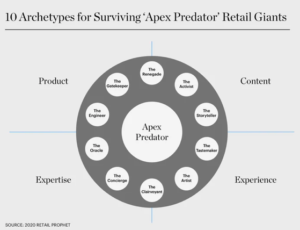Story
The rise of the marketing operations director

The complexity of modern marketing means companies are increasingly splitting marketing into operations and strategy, and increasingly they’re looking for marketing operations directors.
I like to read marketing job postings. I subscribe to several feeds from job portals and also regularly search select companies’ job sections on their websites.
Not because I’m looking for a job but because it’s one of many ways to stay on top of the developments in marketing and management. Observing what leading companies are looking for in terms of roles, responsibilities, and skills helps me understand – or confirm – some of the priorities and challenges they and most likely many other companies have with regards to managing a marketing function today.
A trend towards marketing operations
One of the jobs increasingly posted is the role of marketing operations director. From large, established multi-nationals such as Converse to smaller, entrepreneurial players like Trustpilot, this role is rapidly becoming as important in scope and responsibility as the traditional marketing director. In fact, more and more companies are separating the marketing responsibility into strategy and operations.
In these companies, the marketing strategy director is typically responsible for positioning, segmentation, branding, content, and market and customer strategies. And the marketing operations director is typically responsible for planning, processes, infrastructure, research and analysis, performance management and budgeting. Or put in another way: operations is responsible for the framework, strategy for the content.
I applaud this development and I would recommend that companies with even just a medium level of complexity consider organizing their marketing this way. Why?
Marketing is complicated
Today, marketing is a pretty complicated field. Not only is it in constant flux, driven by the rapid developments in technology and media. The level of deep specialisation and wide knowledge base needed to be successful is extreme: from keeping on top of all available channels, media, and touchpoints, to understanding multiple countries, regions, and cultures, to knowing about a great number of systems, platforms, tools, and applications, to having insight into all parts of the company value chain.
This is on top of the usual knowledge of segmentation, targeting and postioning (STP), 4Ps, customers, competitors, and industry as well as synthesizing all of it into meaningful objectives, goals, strategies, budget allocation, and KPIs supported by efficient, integrated processes and teams with the right skills now and in future.
Of course it is not possible for one marketing director, no matter how senior or brilliant, to encompass all of these disciplines and knowledge.
Marketing must regain ground
In another article, I describe how marketing’s influence within companies is decreasing. There’s a couple of reasons for this negative development and one of them pertains to the lack of focus on marketing operations.
Many marketing leaders are simply not sufficiently on top of the growing importance of building and driving a highly efficient marketing organization that is able to manage not only a globalized, multi-channel landscape but also change and ambiguity – all of this in a resource-effective way, employing data, systems, and processes that boost efficiency and bottom line.
Whether this operations deficit is driven by lack of interest or lack of skill among marketing leaders today I don’t know, but I do know that effective marketing operations represent a huge opportunity for many marketing functions.
Marketing needs friends
Some of the most effective and respected marketing departments I know have strong relationships all over the company they operate in: they review budgets and metrics regularly with the finance controller, they develop roadmaps with IT, they participate in NPD workshops, they attend all key go-to-market, planning, and product development meetings, they go on market visits with the sales guys, they visit suppliers with the productions folks, they… you get the idea.
This is on top of the relationships with agencies, of which there can be many, as well as with any and all country marketing teams.
Marketing needs to not only know what’s going on, they need to be visible in the company, and they need to align their strategies with all the other other functions that they depend on, to ensure common goals and support to get things done.
Effective integration with the business requires a level of capability – time, resources, skills – that many companies realize cannot be done effectively unless the marketing responsibility is split.
Modern marketing requires a modern set-up
Marketing today is more complex than ever. It manages an increasing number of channels and touch points, intersects with an increasing number of disciplines, requires increasingly superior skills in planning, systems and process management, and is expected to deliver increasingly more ROI.
Marketing operations is a means to ensure that marketing is conducted in a more efficient and accountable manner. That’s why I applaud companies who emphasize marketing operations as much as marketing strategy, and why the marketing operations director is here to stay.
_________________________________________________________________________________________
ARTICLE HIGHLIGHTS
- The role of marketing operations director is rapidly becoming as important in scope and responsibility as the traditional marketing director.
- More and more companies are separating the marketing responsibility into strategy and operations; operations is responsible for the framework, strategy for the content.
- It is not possible for any marketing director, no matter how senior or brilliant, to encompass all of the disciplines and knowledge involved any more.
_________________________________________________________________________________________
This article is featured at CMO.com.





